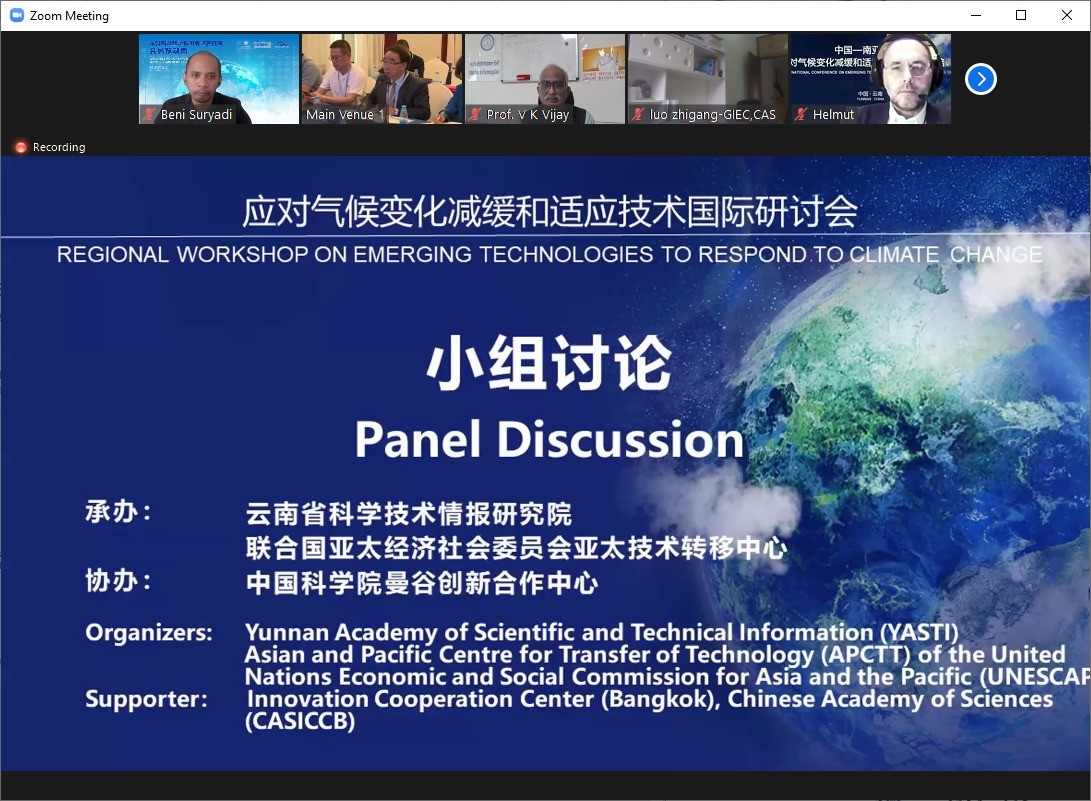Yunnan, 14 September 2021
Climate change has resulted in observable impacts on the environment – such as global warming, sea level rise, melting of glaciers and more frequent extreme weather events, leading to adverse impacts such as on human health, food production, water availability and biodiversity among others. The Asia-Pacific region emits half of the world’s total greenhouse gas, and the number has doubled since 2000. According to the ESCAP 2021 SDG progress report, it remains unlikely that the region will achieve the targets under SDG 13 (Climate Action) by 2030. Managing these challenges requires scaling up the usage of technologies for both climate change adaptation and mitigation across sectors.
Emerging technologies are new, cutting edge, innovative, and (often) disruptive technologies, including artificial intelligence (AI), the Internet of Things (IoT), 5G, digital twins, robotics, Space 2.0 technologies and Big Data. These technologies offer many innovative applications to address the challenges of climate change across various sectors. For example, Big Data is being used to locate harmful emissions along the supply chain and advanced 3D printing helps to reduce carbon emissions and minimize waste in manufacturing. AI can improve energy efficiency by incorporating data from smart meters and thus estimating energy demand, as well as help utilities optimize energy production. 5G-based smart grids can make it possible to connect numerous data points across huge distances ranging from wind turbines to rooftop solar panels and electric vehicle batteries. There are also advanced technological options to reduce fossil fuel-based energy use and greenhouse gas emissions, decarbonize energy supply, use clean energy technologies and enhance carbon sinks. These technologies can be key enablers of sustainability and environmental resilience – offering important opportunities to help assess, mitigate and adapt to climate change.
Achieving the long-term goals of the Paris Agreement to tackle climate change would require both new and emerging technologies as well as novel business models and markets for their successful utilization. The emerging technologies will need to be cost-effective, environmentally sustainable, culturally compatible and socially acceptable while responding to the uncertainties of climate change. The success of technology transfer and diffusion will depend on enabling policy and regulatory environments, capacities to absorb, deploy and improve the technologies appropriate to local circumstances, finance and investment, and cooperation at all levels – international, regional, national and sub-national.
To enhance awareness on the policy tools and strategies to promote transferring and uptake of emerging technologies for climate change adaptation and mitigation, Yunnan Academy of Scientific and Technical Information (YASTI), China supported by the Chinese Academy of Science Innovation Cooperation Center, Bangkok (CASICCB) and United Nations Economic and Social Commission for Asia and the Pacific (ESCAP) is organising the Regional Workshop on Emerging Technologies to Respond to Climate Change on 14-17 September 2021.

Beni Suryadi, in his capacity as the ACCEPT Project Manager, joined the panel discussion alongside other experts; Dr Atya KAPLEY, Senior Principal Scientist, Council of Scientific and Industrial Research (CSIR) – National Environmental Engineering Research Institute (NEERI), India, Dr Ghasem AZIZI, Processor in Climatology, University of Tehran, Islamic Republic of Iran, Dr Eun Joo KIM, Principal Researcher, Science and Technology Policy Institute (STEPI), Republic of Korea, and Chamila JAYASEKERA, Director – Research & Development, Sri Lanka Sustainable Energy Authority, Sri Lanka, moderated by Dr MA Minxiang, Professor, Director-General, YASTI.
Beni shared the latest ASEAN Power Updates, highlighting that about 82% of the ASEAN new capacity in 2020 was renewable (a notable new trend). The full report can be accessed here.